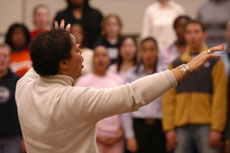Lift every voice
February 4, 2005
The sound of soprano voices spills into the hallway outside the Choral Rehearsal Room in the Krannert Center for the Performing Arts.
Inside, Dr. Ollie Watts Davis stands in front of about forty women. They watch her closely as she repeats the verse they just sang. Only there is something different about the words when she sings them.
“Oh Lord, I just come from the fountain, His name so sweet,” Davis sings, displaying the pronunciation and breath control she wants the group to master.
She then cups her hands together and holds them out as though carrying a precious gift.
“I’m presenting you my voice,” she says. “Now you present to me.”
Get The Daily Illini in your inbox!
After the soprano sectional, the rest of the choir trickles in and takes their place on the raised platform.
Every week, 100 students, faculty and community members gather for the University of Illinois Black Chorus rehearsal.
The choir is now preparing for the seventh biennial Black Sacred Music Symposium, a three-day music conference which will take place Feb. 10-13.
Davis, who is concluding her 23rd year as conductor of the Black Chorus, said the mission of Symposium is three-fold: the music, the method and the message of the Black Sacred Music Tradition – a musical expression rooted in the religious experience of African-Americans. Davis said the tradition includes various musical forms such as gospel, spirituals, anthems and solo presentation.
The conference will consist of classes, two roundtable discussions and a culminating concert performance by the Black Chorus and guest participants on Feb. 13. Davis said those who attend the conference will learn about the development and vocal technique of the Black Sacred Music Tradition.
“I think that those who participate will come away as better listeners,” she said. “They will have a more educated ear to really discern whether what they’re hearing on the radio or in the community is really part of this tradition.”
Founded by four students in 1968, the UIUC Black Chorus remains a popular class and concert choir. Besides the Black Sacred Music Symposium, the choir puts on an annual Mom’s Day concert in the spring and performs at venues across the country.
Edward Rath Jr., associate director for the School of Music, said the class is an important part of the school’s course selection.
“It’s a tremendous addition because it allows us to offer students a very valid and different type of repertoire to which they otherwise might not be exposed,” Rath said.
For their participation, University students receive one hour of credit, but most say it is the music – and the experience of sharing in the production of it – that keeps them coming back twice a week.
“Every time I come in here, no matter how bad my day was, I look forward to coming to rehearsal because it always brightens my day,” said Sarah Okner, sophomore in LAS.
Okner, who also sang in high school, said she decided to take the class after attending a Black Chorus performance.
“I was just really attracted to the energy,” she said. “It looked like they were having so much fun on stage.”
Veteran choir member and Urbana resident, Donna Jenkins said the performances reflect the choir’s close relationship off-stage.
“We’re like a family,” she said. “When we have a situation, or something is on our minds or in our hearts, we all express ourselves.”
Jenkins has sung in the Black Chorus for the past 10 years. Sometimes, she said multiple sclerosis keeps her from singing, but on those days still attends rehearsal.
“Dr. Davis told me, ‘Your presence means a lot.’ Even if I can’t sing I can still be a support,” Jenkins said.
It is the concern Davis demonstrates for each member that Jenkins and others appreciate most.
Despite the large size of the choir, Davis said she wants people to understand their individual value. Besides their singing, she said she pays attention to students’ emotional and physical states.
“Teaching music is the mechanism I use to reach people,” Davis said.
Part of that teaching includes placing music in a historical context. For example, Davis said she might talk about slavery while she teaches the choir a spiritual.
“Music is about people,” she said. “It’s a people’s experience. When you learn music you learn about people.”
In this case, students also learn lessons they can apply to their life outside rehearsal.
“We don’t just sing; (Dr. Davis) teaches values of life,” Jenkins said. “The majority of students, as well as I, get an opportunity to take what we learn here and take it to our classroom, to our job. She teaches professionalism.”
And Davis learns from her students as well.
“I enjoy their energy, their optimism, and I enjoy their intellect. They’re stimulating. I learn a lot from them. It’s a learning laboratory for them and for me.”
In addition to annual concerts, the Black Chorus fundraises and performs at benefit events.
Although the class focuses on the Black Music Tradition, Davis is quick to point out the diversity – in age and ethnic and racial composition – of the choir.
“We try to reflect the mission of the University,” she said. “We’re inclusive. We are diverse. I think we reflect the heart of the University.”
To register for the conference, stop by the Black Chorus office (Room 203) in the African American Cultural Program on Monday between 11 a.m. and 1 p.m. or on Wednesday between 1 and 3 p.m. Registration will also take place in the Krannert Center Lobby on Thursday, Feb. 10 at 5 p.m.
Tickets for the Symposium concert can be purchased online and at the Krannert ticket office.







